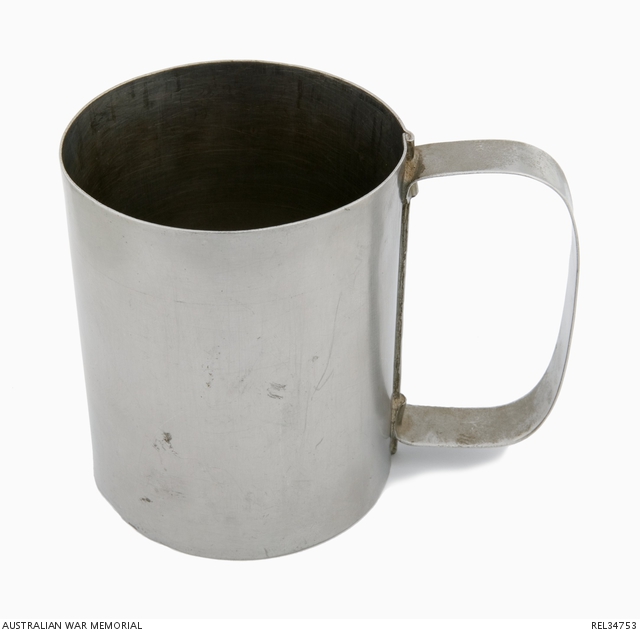| Places | |
|---|---|
| Accession Number | REL34753 |
| Collection type | Heraldry |
| Object type | Personal Equipment |
| Physical description | Solder, Stainless steel |
| Maker |
Howard, James |
| Place made | Singapore |
| Date made | c1942-1945 |
| Conflict |
Second World War, 1939-1945 |
Handmade mug : Corporal J Howard, 2/15 Battalion


Drinking mug constructed with a soldered vertical lock seam and soldered handle, all made from stainless steel. Base is engraved 'E.W.B. / VX22206'. Scratched faintly adjacent to this is QX21513.
Drinking mug related to the service of QX21513 Corporal James Howard of Wynnam, Queensland, born Brisbane 25 March 1906, who enlisted on 7 May 1941. Howard was assigned to 2/15 Battalion and embarked for overseas service from Melbourne on 18 September 1941. He saw brief service in the Middle East before embarking for Australia on 1 February 1942. Components of 2/15 Battalion were landed at Java in early March to join the small Australian force (Black Force, under Brigadier A S Blackburn, 7 Division), responsible for defending the island against the advancing Japanese. Howard was reported missing on 7 March; the island fell to the Japanese two days later. Howard spent the war in Japanese prison camps, working on the Burma-Thai railway. He was ultimately released from Changi. The mug was made by or for Howard in Changi and is apparently identical to one made by or for his best mate, VX22206 Lance Corporal Eric Walter Bryant, of Ballarat, who served with 105 General Transport Company. Both mugs were engraved on the base with the owner's initials and service number. Howard and Bryant were released from prison in early September 1945 and arrived in Sydney aboard the hospital ship Manunda on 27 October. On the return trip, the two friends swapped mugs, scratched each other's service number under those already engraved on the base and vowed to keep in touch. Living at opposite ends of Australia, in Queensland and Victoria, they found little opportunity to catch up, but Howard's daughter recalls they finally managed to do so in the 1960s. Mr Howard died of complications of his imprisonment in 1976; he was unable to regain his weight after his release. His daughter recalls he was a very forgiving man and never expressed any anger about his treatment as a prisoner, saying he could easily have died in battle instead. His main obsession was ensuring his own children were well fed and never wasted food.